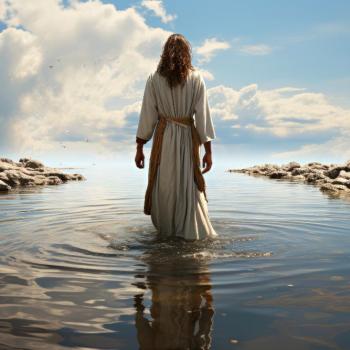
To be a Christian, You Must First Deny It
Around the mid-19th Century in Denmark, it was well-known that Soren Kierkegaard was not a “Christian” – he had made that almost annoyingly clear. This, despite the fact that he was also well known for his writings on Christianity. Kierkegaard remained steadfast in this assertion until he died in 1855.
Needless to say, this frustrated the academic elite and church leaders of his generation because while he was denying being a Christian, he still had tremendous influence over their congregations. Even though some academics ignored him – considering him an eccentric nobody – many felt threatened by his influence.
Misinformation campaigns and rebuttal attacks, along with relentless teasing over his debilitating appearance, eventually turned the tide of public opinion. In the end, the establishment came out on top and as a result, Kierkegaard died alone and largely misunderstood.
On Being a Christian
The Church in 19th Century Denmark was run by the state. The confluence between Church and state is not all that dissimilar from our current situation in the United States. Kierkegaard used the term “Christendom” to describe this relationship. Being a pastor during that time was seen as a respectable vocation and one that paid well. Church was considered the norm, and relatively speaking, everyone was a “Christian”.
Kierkegaard saw that by all of these people describing themselves as Christians, they were essentially diluting what it meant to be a Christian: “…when everyone is a Christian, no one is a Christian.” In fact, he also argued that Christianity ceased to be once it became legal. Kierkegaard wanted nothing to do with Christendom.
Kierkegaard understood this relationship between church and state to be one that did not require any sort of piety. It was simply a social construct that catered to the bourgeois of his time. Membership within the church was no different from being a member of a country club.
This begs the question, what did Kierkegaard consider necessary to be a true follower of Jesus? First, he would probably argue that no one can ever be certain that they will one day share the heavenly abode with Jesus. That aside, he would probably maintain that the best chance one has of being the type of Christian that the New Testament demands is to surrender one’s life to the will of God as demonstrated by how one lives in the world.
The problem for Kierkegaard’s generation was that the people had a “fused” worldview where no distinction could be made between one’s faith and one’s service to the crown. (Learn more about worldview fusion.) If that sounds familiar, it’s because the same problem can be seen within conservative evangelicalism today. That is, no real distinction exists between their faith and their politics. In their mind, being political is doing God’s work. What’s more, the blowback one might experience for practicing their faith this way is simply persecution, which serves as even greater motivation for continuing the practice. This is one reason why their fervor remains so intense.
On Denying One’s Christianity
Denying one’s Christianity is not the same thing as denying one’s faith in Jesus Christ. This may sound like a contradiction since the term Christian means “follower of Christ”. Words are most often defined by their usage and not their etymology. For Kierkegaard, the term Christian was meaningless. He opted for not defining an alternative since doing so would eventually result in the same problem. This is because people were unable to understand the fundamental problem of their time.
It is the same in our time. As Christianity becomes defined more and more by ultra-conservative (or even ultra-liberal ones), the identification of one as being labeled a Christian is bankrupt of meaning. This is largely because such ideologies are distortions of the message of Christianity.
The problem was perfectly illustrated in the local elections that took place recently in my city. One of the individuals running for school board had made it clear that he was a “Christian”. But what did that mean? Was that code for I’m going to make our school system a breeding ground for Trumpism? Since I happened to know this guy, I had to email him and ask him what he meant by calling himself a Christian. Honestly, it was somewhat embarrassing.
The term “Christian” should evoke a sense of shared belief and unity in the teachings of Jesus Christ; however, it has increasingly become associated with political affiliations and divisions. This shift raises concerns about the core principles of Christianity, which emphasize love, compassion, and community. Instead of fostering a collective identity rooted in faith, the label has often been co-opted to signify particular political ideologies, leading to misunderstandings and alienation among those who may not align with such views.
When people hear the word Christian, they think of politics, not the message of Christ. That should be an indication that what many are doing in the name of Christ is wrong.
Some Final Thoughts
I think Kierkegaard was on to something. The only way to be a Christian is to first deny being one. This is not just the ramblings of a lunatic. There is a biblical precedent for this. Although Jesus certainly never denied being Jewish, he did redefine the public’s perception of what it meant to be one. Ironically, that is what being a Christian is supposed to be – a redefined, more authentic version of Judaism.
These days, it seems almost fruitless to have these types of conversations because humans have never been good at doing what God requires. From the Garden to Judaism to the Roman Catholic Church and Reformation, we have always been about us. It seems like there are only short times in history that we have done what is required. Maybe I am just being overly pessimistic, but I’m not sure we can recover Christianity without some catastrophic event. Something that will refocus people’s priorities and invoke a sense of shared spirituality. To put the needs of others before our own. To take seriously what Jesus demands of us. To understand the power of humility. to understand that being a ”Christian” is not about shared beliefs but shared actions that bring hope into the world. That’s really the fundamental requirement – being manifestations of hope.
You can view my UNenlightenment YouTube Channel HERE
You can view my UNenlightenment Podcast HERE
You can follow me on FaceBook HERE
Transform your life today by getting my book UNenlightenment HERE
Purchase my newest book The Kingdom of Man HERE














